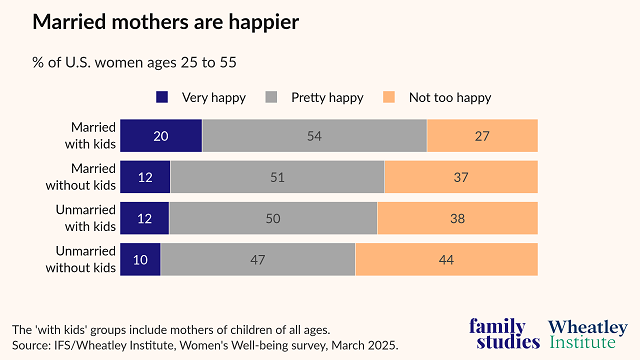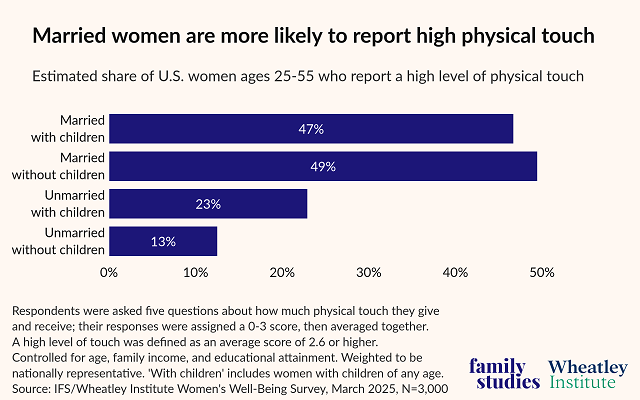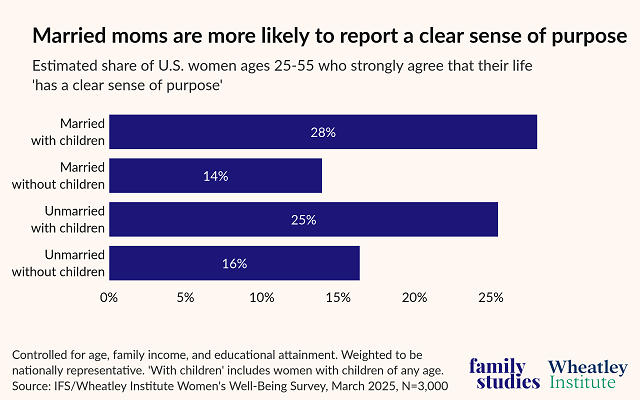Highlights
- Married mothers are nearly twice as likely as their single and childless counterparts to report being “very happy.” Post This
- Women with children are also the most likely to feel that their life has a clear sense of purpose, a key contributor to life satisfaction. Post This
- One reason so many young women today have a negative view of marriage and family is that we have been taught to blame the institution of marriage rather than take responsibility for it. Post This
I still recall the first time I heard a young woman express her disinterest in marriage and children. Early in my time at college while chatting with some friends, I made a comment that I couldn’t wait to find my husband and have children. It was met with melodramatic scowls from each of my new girlfriends who were amused by my optimism. It wouldn’t be the last time I heard that sentiment. My initial shock eventually turned into dismal expectation as I received similar reactions again and again, with little variety, during my four years of college. The same reasons would almost always accompany any explanation: “Marriage makes people miserable eventually,” or “Children eat up all of your time, money, and freedom.”
The certainty with which these young women spoke made me question for a moment the reality that awaited me if I did get married and have children. I am not naïve about the struggles of raising a family—my own family certainly isn’t perfect—but not once have I ever considered completely forgoing these vital institutions in order to avoid these struggles. Even after hearing these objections—which, admittedly, had some grains of truth to them—I thought “so what?” To me, the joys of marriage and children are so great that there is little that could dampen my anticipation of having them in my future, and virtually nothing that could take away their intrinsic value.
As it turns out, my friends’ negative views of marriage and motherhood do not align with what the research actually shows. A new report from the Institute for Family Studies and The Wheatley Institute, which details findings from a survey of 3,000 women between the ages of 25 and 55, finds that marriage and motherhood both contribute positively to women’s well-being and quality of life. In fact, married mothers are nearly twice as likely as their single and childless counterparts to report being “very happy.”

Note: This figure shows descriptive results, unlike other findings in the report that adjust for women’s age, income, and education.
They are also the most likely to report that life is enjoyable most or all of the time (47%), while single and childless women are the least likely (34%) to report the same.
There are many things that contribute to these disparities, but in particular, married women tend to receive the most physical affection.

Women with children are also the most likely to feel that their life has a clear sense of purpose, another key contributor to life satisfaction. In addition, 49% of married mothers say their life feels meaningful all or most of the time, compared to 43% of unmarried mothers, 41% of married women without children, and 32% of unmarried women without children.

Married mothers are not as miserable as many of my peers think. Indeed, they are the happiest and most fulfilled. So why do so many of my female friends have this negative view of marriage and family? One reason is their own bad experiences. “I don’t want to end up like my parents,” is a response I heard often. Fair enough. But this attitude is not unique to my generation. For hundreds of years, generation after generation has sought to be better than those who came before them, to learn from past mistakes. So why is mine throwing in the towel on marriage and family?
One reason so many young women today have a negative view of marriage and family is that we have been taught to blame the institution of marriage rather than take responsibility for it.
I would argue it is because we have been taught to blame the institution of marriage rather than take responsibility for it. For years now, popular culture has weakened our understanding of and respect for the institutions of marriage and the family, leading many young people to believe there is nothing left worth fighting for.
Many of my friends who do not want to get married or have children would admit that they grew up with the typical dream of finding a husband and becoming a mother. But with the onset of the digital age, popular media and celebrity examples often became a dominant source of character and virtue development. Movies like “Eat, Pray, Love” that glorify divorce, headlines such as “Women Who Stay Single and Don’t Have Kids Are Getting Richer,” and young but influential celebrities like Chapell Roan that deride motherhood as a living hell, all work against these desires—destroying them instead of nurturing them.
The good news is that marriage and family, while challenging, are radically fulfilling in ways that single life and career chasing are not, as this new IFS/Wheatley report confirms. Changing the narrative starts with promoting research and information that demonstrate that marriage and family-life are still fulfilling for those who partake in them. These bedrock institutions have not changed. We have. And it is time our society reclaims them and reaps their priceless benefits once more.
Read or download the full IFS/Wheatley Institute report, In Pursuit: Marriage, Motherhood, and Women's Well-Being.
Sophie Anderson is Research Coordinator at the Institute for Family Studies.












